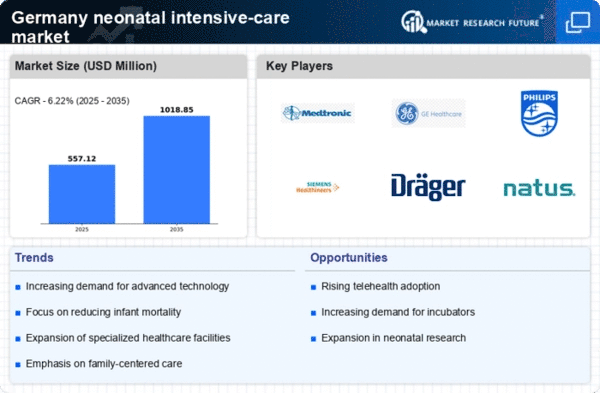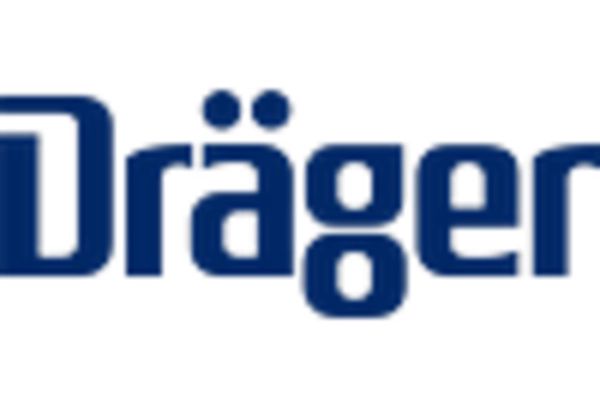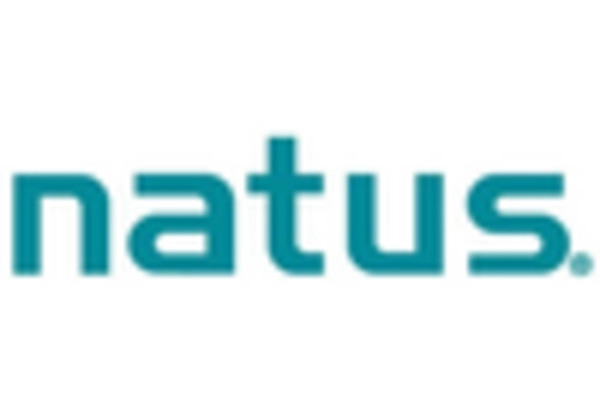Advancements in Medical Technology
Technological innovations are transforming the landscape of the neonatal intensive-care market. The introduction of advanced monitoring systems, incubators, and respiratory support devices has significantly improved the quality of care for critically ill newborns. In Germany, the market for neonatal medical devices is projected to grow at a CAGR of 7% over the next five years. These advancements not only enhance survival rates but also reduce the length of hospital stays, which is beneficial for both healthcare providers and families. As hospitals adopt these technologies, the neonatal intensive-care market is expected to expand, driven by the demand for improved patient care and operational efficiency.
Government Initiatives and Funding
Government policies and funding initiatives play a pivotal role in shaping the neonatal intensive-care market in Germany. The federal and state governments have recognized the importance of neonatal care, leading to increased financial support for NICUs. In recent years, funding allocations have risen by approximately 15%, aimed at enhancing facilities and improving care standards. This financial backing is crucial for hospitals to acquire state-of-the-art equipment and implement best practices in neonatal care. Consequently, the neonatal intensive-care market is likely to experience growth as hospitals leverage these funds to enhance their services and improve patient outcomes.
Focus on Quality of Care and Outcomes
The emphasis on quality of care and patient outcomes is becoming more pronounced in the neonatal intensive-care market. Hospitals in Germany are adopting quality improvement initiatives aimed at enhancing care delivery and reducing complications among newborns. This focus is supported by various accreditation bodies that set standards for neonatal care. As a result, healthcare facilities are investing in staff training and evidence-based practices to improve outcomes. The neonatal intensive-care market is likely to benefit from this trend, as hospitals strive to meet these standards and provide the best possible care for their patients.
Rising Prevalence of Premature Births
The increasing incidence of premature births in Germany is a critical driver for the neonatal intensive-care market. Recent statistics indicate that approximately 8% of all births in the country are preterm, necessitating specialized care. This trend is likely to elevate the demand for neonatal intensive-care units (NICUs) and associated services. As healthcare providers strive to improve outcomes for these vulnerable infants, investments in advanced medical technologies and training for healthcare professionals are expected to rise. The neonatal intensive-care market is thus positioned for growth, as hospitals expand their capabilities to cater to the needs of premature infants, ensuring they receive the necessary interventions to thrive.
Increasing Awareness of Neonatal Health
There is a growing awareness of neonatal health issues among the general public and healthcare professionals in Germany. Campaigns aimed at educating parents about the importance of early intervention and specialized care for newborns are gaining traction. This heightened awareness is likely to lead to an increase in hospital visits and referrals to NICUs, thereby driving demand in the neonatal intensive-care market. Furthermore, healthcare providers are increasingly focusing on training programs for staff to ensure they are equipped to handle complex neonatal cases. As awareness continues to rise, the neonatal intensive-care market is poised for growth, reflecting the changing attitudes towards neonatal health.

















